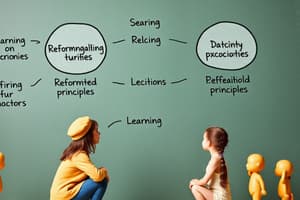Podcast
Questions and Answers
What is the name of the Russian psychologist who conducted classical conditioning experiments on dogs?
What is the name of the Russian psychologist who conducted classical conditioning experiments on dogs?
Ivan Pavlov
During classical conditioning, what is the term used for the stimulus that initially produces a natural response?
During classical conditioning, what is the term used for the stimulus that initially produces a natural response?
Unconditioned Stimulus
What is the term used for the neutral stimulus that is repeatedly paired with the unconditioned stimulus?
What is the term used for the neutral stimulus that is repeatedly paired with the unconditioned stimulus?
Conditioned Stimulus
Flashcards
Classical Conditioning
Classical Conditioning
A type of learning where a neutral stimulus is paired with an unconditioned stimulus to evoke a conditioned response over time.
Unconditioned Stimulus (UCS)
Unconditioned Stimulus (UCS)
The initial stimulus that naturally and automatically triggers an unconditioned response.
Unconditioned Response (UCR)
Unconditioned Response (UCR)
The natural, unlearned response to an unconditioned stimulus.
Conditioned Stimulus (CS)
Conditioned Stimulus (CS)
Signup and view all the flashcards
Conditioned Response (CR)
Conditioned Response (CR)
Signup and view all the flashcards
Extinction (Classical Conditioning)
Extinction (Classical Conditioning)
Signup and view all the flashcards
Spontaneous Recovery
Spontaneous Recovery
Signup and view all the flashcards
Stimulus Generalization
Stimulus Generalization
Signup and view all the flashcards
Stimulus Discrimination
Stimulus Discrimination
Signup and view all the flashcards
Operant Conditioning
Operant Conditioning
Signup and view all the flashcards
B.F. Skinner
B.F. Skinner
Signup and view all the flashcards
Shaping (Operant Conditioning)
Shaping (Operant Conditioning)
Signup and view all the flashcards
Extinction (Operant Conditioning)
Extinction (Operant Conditioning)
Signup and view all the flashcards
Stimulus Generalization (Operant Conditioning)
Stimulus Generalization (Operant Conditioning)
Signup and view all the flashcards
Stimulus Discrimination (Operant Conditioning)
Stimulus Discrimination (Operant Conditioning)
Signup and view all the flashcards
Reinforcement
Reinforcement
Signup and view all the flashcards
Immediate Reinforcement
Immediate Reinforcement
Signup and view all the flashcards
Delayed Reinforcement
Delayed Reinforcement
Signup and view all the flashcards
Fixed Ratio Schedule
Fixed Ratio Schedule
Signup and view all the flashcards
Fixed Interval Schedule
Fixed Interval Schedule
Signup and view all the flashcards
Variable Ratio Schedule
Variable Ratio Schedule
Signup and view all the flashcards
Variable Interval Schedule
Variable Interval Schedule
Signup and view all the flashcards
Positive Reinforcement
Positive Reinforcement
Signup and view all the flashcards
Negative Reinforcement
Negative Reinforcement
Signup and view all the flashcards
Punishment
Punishment
Signup and view all the flashcards
Negative Punishment
Negative Punishment
Signup and view all the flashcards
Observational Learning
Observational Learning
Signup and view all the flashcards
Social Learning Theory
Social Learning Theory
Signup and view all the flashcards
Behavior Modification
Behavior Modification
Signup and view all the flashcards
Systematic Desensitization
Systematic Desensitization
Signup and view all the flashcards
Study Notes
Learning
- Learning is influenced by outcomes. Something happens, then something else happens.
- Reinforcement of behavior when it occurs. One event can create learning opportunities.
- Characteristics of learning include shaping, extinction, stimulus generalization, and stimulus discrimination. ABC idea (antecedent, behavior, consequence) is a part of learning.
Learning - Reinforcement
- Reinforcement is something that happens, a behavioral response, followed by a consequence.
- Delayed reinforcement can be effective, such as a speeding ticket.
- Intermittent reinforcement schedules, such as fixed ratio or fixed interval, involve reinforcement after a set number of responses or a set time period.
- Variable ratio or variable interval schedules involve unpredictable reinforcement intervals.
Learning - Positive and Negative Reinforcement and Punishment
- Positive reinforcement involves increasing a response by adding a stimulus.
- Negative reinforcement involves increasing a response by removing a stimulus.
- Punishment involves reducing a response by adding or removing a stimulus.
Learning - Observational Learning
- Observational learning involves watching what happens and paying attention to the consequences.
- Social learning theory involves modeling (mimicking) others' behaviors and consequences.
- Key figures in social learning theory include Albert Bandura, demonstrating the significance of cognitive factors like knowledge and expectations, along with environmental factors, notably social norms and influences on others.
- Behavioral factors like skills and practice, and self-efficacy or self-beliefs, are significant aspects of observing and learning.
Lecture #13 - Thought and Language
- Thought and language are highly interconnected.
- Language includes complex abilities such as expressing thoughts, communicating meaning, and using language in cognition.
- Language helps us understand our experiences and interactions relating to social contexts.
- Language abilities are tied to cognition; the ability to express ideas and thoughts, communicate, and relate to language and cognition.
Language Acquisition
- Language acquisition is a biologically predetermined ability.
- Humans are biologically wired for language.
- Different regions of the brain are involved in language processing.
- Damage to language centers can impair communication and language use impacting intelligence and ability to communicate. Key milestones in language development range from cooing and babbling in infancy to complex grammar and expressing complex ideas in later childhood.
Cognition and Cognitive Processes
- Cognition involves subjective experiences and thoughts, varying over centuries.
- Psychology has explored cognition via psychoanalysis, behaviorism, and cognitive psychology.
- Stream of consciousness and the experience of thinking are crucial aspects of cognition.
- Individuals process and organize information in problem solving with steps like specifying, analyzing, formulating solutions, evaluating, and determining the outcome.
Decision-Making Strategies
- Consider both short-term and long-term outcomes in choices.
- Strategies compare alternatives and consider negative effects.
- It is important not to eliminate unfamiliar alternatives out of hand.
Mental Health Stigma
- Mental health stigma includes societal negativity concerning mental health issues.
- Individuals may avoid seeking help due to fear of judgment.
- Self-stigma and label avoidance contribute to avoiding seeking help.
Lecture #14 - PTSD and Substance Use
- Post-traumatic stress disorder (PTSD) occurs after experiencing or witnessing a traumatic event.
- Substance use disorders (SUD) can be associated with PTSD.
- Substance use can be a coping mechanism for PTSD symptoms, such as avoidance, arousal, and intrusions.
- Factors influencing the co-morbidity of PTSD and SUD include childhood trauma history and lack of adequate social support.
- This often relates to an individual's ability to manage negative emotions.
Cognitive Distortions and Reasoning
- There are various cognitive errors or deviations from logic-related reasoning.
- Inductive reasoning draws broad conclusions based on specific observations.
- Deductive reasoning uses general principles to predict specific outcomes.
- Confirmation biases can lead to prioritizing information that supports existing beliefs.
- Availability and representative heuristics impact decision-making related to past events.
Studying That Suits You
Use AI to generate personalized quizzes and flashcards to suit your learning preferences.




